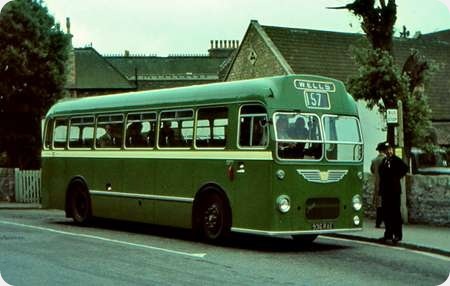
Bristol Omnibus
1963
Bristol MW5G
ECW B45F
Typical but not typical!
On Sunday, June 28, 1964, a Bristol MW5G (typical) Wells depot bus stands at Clevedon Six Ways awaiting departure on service 157. This was the first day of operation of a new (not typical in those days!) Sunday only service to attract tourists. The service didn’t run in 1965!
The destination display was the BOC standard at the time, I think known to ECW as the Z layout. It was unique in the Tilling group for having a four track number display, adopted to cope with the addition of suffix letters became rife. In the city, L (short working) W (works service) and the route variations A, B, C and D were added to existing route numbers that could already have three digits.
Photograph and Copy contributed by Geoff Pullin
31/01/16 – 13:33
I grew up in Bristol and had never heard of this 157 service, maybe not surprising at it was so short lived.
Suffix letter W was not used for works services. F, H and J were those generally used for extensions beyond Filton to the aircraft factories or beyond Avonmouth to the smelting and chemical works. C was used for journeys on cross-city routes terminating in the central area. K was used for school services – K for Kids, we all assumed!
Bristol city services were renumbered below 100 in 1966, and at the same time Country routes were renumbered without suffix letters so four track number blinds were no longer needed.
Geoff Kerr
01/02/16 – 07:35
This picture brings back happy memories of schooldays in Wells and riding these vehicles on service 165 to Glastonbury. They were in the very smart OMO livery with more cream then.
Richard Stubbings
04/12/19 – 07:11
I have just realised that there is another ‘untypical’ aspect to this vehicle. Like 2568 – C2607, it was built with the air suspension option that became available in 1962. Eric Hardy, Chief Engineer of BOC at the time specified the air suspension option to reduce lifetime costs, including an easier life for the bodywork. BOC was the only company to specify the option for stage vehicles and I heard him complain bitterly when BCV deleted the option for the last sanctions of MWs. It was all very sad that the first MWs delivered on leaf springs to the company after the deletion of the option (2137) had dual purpose bodywork and coach livery!
Pondering this anomaly, I wonder if the last batch of leaf-sprung MWs were shoe-horned into production a bit quick to fill a gap because the RE low frame chassis was running late. The outstanding orders for MWs for some companies (eg ECOC) were satisfied with air sprung – no option -RESLs!
Geoff Pullin
Leave a Reply